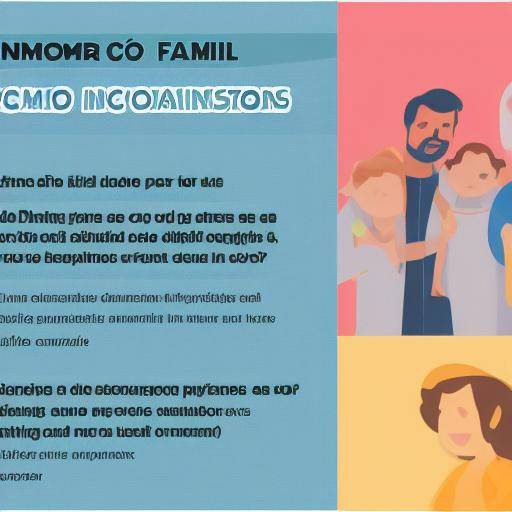
At present, the balance between personal life and work is a crucial issue for the well-being of people. Harmony between these two spheres not only contributes to mental and emotional health, but also has a positive impact on labour productivity. In this article, we will explore the role of family support, effective communication and mutual understanding in achieving this desired balance.
Introduction
The term "equilibrium between personal life and work" has gained great relevance in a world characterized by the constant interconnection and the accelerated pace of modern life. In this context, the family plays a key role, being a pillar of emotional and logistical support for those seeking to maintain a balance between their professional responsibilities and their personal lives.
Effective communication, mutual understanding and unconditional support by the family are essential to achieving this balance. During the development of this article, we will explore in detail how these pillars can positively influence the successful management of labour and personal demands.
History and background
Historically, the notion of balance between personal life and work has evolved as society has experienced economic, technological and cultural transformations. From the traditional working model to the current scenario marked by labour flexibility, the concept of conciliation has undergone significant changes over time.
If we go back to the origins of the industrial revolution, we find the emergence of long working days and challenging conditions that hindered the reconciliation between personal life and work. Over time, social and legislative movements have helped shape a more equitable and responsive working environment to individual needs.
The incorporation of women into the labour market, as well as the recognition of the impact of labour stress on family life, have promoted the discussion and adoption of policies aimed at providing tools for managing the balance between personal life and work.
In-depth analysis
Effective communication becomes a fundamental pillar in the successful management of the balance between personal life and work. The ability to express the needs and expectations, as well as to listen actively and emphatically to others, is crucial for establishing agreements and limits to harmonize professional and personal responsibilities.
In this sense, mutual understanding acquires an invaluable dimension. Recognition and respect for the needs and aspirations of each family member create an enabling environment for the development of strategies that promote reconciliation. Empathy and willingness to provide support are critical to fostering a family environment that promotes the balance between personal life and work.
Comprehensive review
The application of these pillars in everyday life finds its resonance in countless situations. From the organization of flexible hours and the equitable distribution of household responsibilities to the promotion of family quality moments, effective communication, mutual understanding and family support can be translated into concrete actions that strengthen the desired balance by many people.
At the job level, companies that foster a culture of respect for the personal life of their employees and promote family reconciliation programs often experience positive results in terms of retaining talent and productivity. Recognition of the importance of these elements within the working environment has led to the implementation of policies that seek to promote a healthy balance between labour obligations and personal well-being.
Comparative analysis
The interrelationship between effective communication, mutual understanding and family support is evident in its potential to generate synergies. While each of these pillars has its own characteristics, together they form an integral system that can enhance the achievement of the balance between personal life and meaningful work.
Effective communication facilitates mutual understanding, allowing family members to align themselves with common goals and find collaborative solutions to the challenges that may arise. In turn, family support strengthens communication and understanding, providing emotional support that promotes trust and tranquility in the family environment.
Practical advice and useful recommendations
Some practical tips that can help strengthen communication, understanding and family support in the search for a balance between personal life and work include:
- Set family quality schedules to disconnect from work responsibilities and enjoy shared moments.
- Promote openness and honesty in family conversations, fostering a space in which each member feels heard and understood.
- Visualize and plan family goals that integrate individual and collective needs, enabling a comprehensive approach to personal and work life.
- Providing emotional and logistical support at challenging times, recognizing the importance of family support in managing labour stress.
Industry perspectives and expert opinions
Several experts in family psychology and labour development agree on the fundamental importance of family support in achieving the balance between personal life and work. The presence of a strong support system in the family environment contributes significantly to the emotional health and work performance of individuals.
According to studies carried out by specialized labour institutions, it has been observed that employees with a family environment that provides support often present lower levels of labour stress and greater satisfaction in their professional roles. This correlation reinforces the relevance of family support as a determining factor in managing the balance between personal life and work.
Case studies and applications in real life
To illustrate the importance of communication, understanding and family support in practice, it is important to examine specific cases in which these elements have been decisive. Records of families who have successfully managed the balance between personal life and work can provide valuable lessons and inspirational examples for other community members.
One outstanding case is that of the Gomez family, whose members have implemented open communication routines and shared schedules that have allowed them to coordinate their work and personal activities effectively. This strategy has strengthened family ties and has generated an atmosphere of peace and mutual support that has positively influenced the overall well-being of its members.
Future trends and predictions
As society evolves and adapts to the challenges and opportunities of the modern working environment, there are trends that point to a greater appreciation of the reconciliation between personal life and work. The integration of technologies that facilitate teleworking and the adoption of labour policies aimed at promoting time flexibility are indicative of increasing awareness of the importance of harmonizing the areas of work and personnel.
The predictions point to an increase in the implementation of family support programs by companies and organizations, as well as a greater assessment of the soft skills related to effective communication and mutual understanding in the field of work. These trends augur a conducive scenario for strengthening the balance between personal life and work.
Conclusion
In conclusion, the role of family support, effective communication and mutual understanding in managing the balance between personal life and work is undeniable. These pillars provide solid foundations for building a reality in which labour demands do not eclipse family well-being, or personal well-being. By strengthening communication, understanding and mutual support in the family environment, conditions are created for harmonious coexistence that enhance both professional development and emotional well-being.
Frequently asked questions
Why is communication important in the balance between personal life and work?
Effective communication is essential for establishing agreements, expressing needs and finding joint solutions that promote a balanced coexistence between labour and personal responsibilities. The ability to communicate openly and emphatically contributes significantly to family well-being and the effective management of labour stress.
How to foster mutual understanding in the family environment?
Promoting mutual understanding involves developing empathy and respect for the individual needs of each family member. Active listening, recognizing emotions and providing space for the expression of thoughts and feelings are practices that strengthen mutual understanding in the home.
What is the impact of family support on labour productivity?
Family support directly influences labour productivity by contributing to emotional well-being and effective stress management. A family environment that provides emotional and logistical support creates an enabling environment for professional development, allowing individuals to face labour challenges with greater tranquility and confidence.
How can effective communication impact on the upbringing of children?
Effective communication in the upbringing of children promotes an environment of trust and understanding, facilitating the transmission of values and constructive conflict resolution. This ability strengthens family ties and contributes to the emotional and social development of children, laying solid foundations for their future balance between personal and work life.
What kind of labour policies can promote the balance between personal life and work?
Labour policies that promote the balance between personal life and work include time flexibility, teleworking, support for care of dependents and welfare programs that promote the emotional health of employees. These measures seek to reconcile labour demands with the individual needs of workers.
How to manage the balance between personal life and work in situations of high labor stress?
In situations of high labour stress, it is crucial to establish clear limits, communicate family needs and seek the support of family members. Flexibility in the distribution of responsibilities and the promotion of moments of rest and recreation in the family are effective tools to manage balance in challenging periods.
In conclusion, the role of family support, effective communication and mutual understanding in managing the balance between personal life and work is undeniable. These pillars provide solid foundations for building a reality in which labour demands do not eclipse family well-being or personal well-being. By strengthening communication, understanding and mutual support in the family environment, conditions are created for harmonious coexistence that enhance both professional development and emotional well-being.
With the support of effective communication, mutual understanding and family support, it is possible to draw a path to the desired balance, building an environment in which personal realization and professional growth are harmoniously complemented. Ultimately, the integrity and fullness of people are favored when family and work collaborate in creating a balanced and meaningful life.






